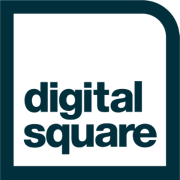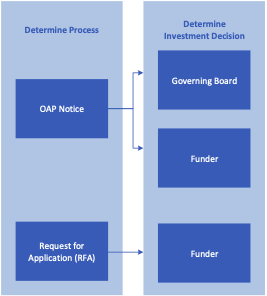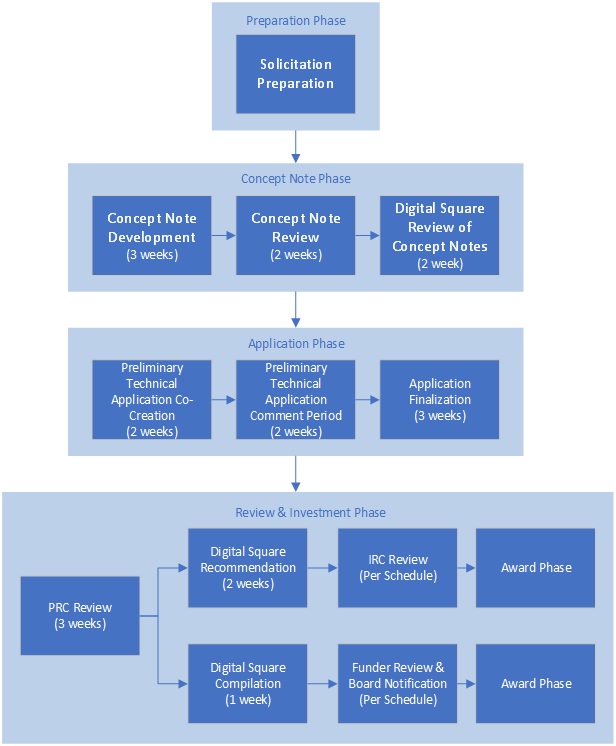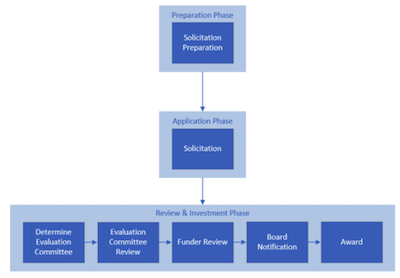Grant Solicitation Processes: Difference between revisions
| Line 57: | Line 57: | ||
| Step 7: Board notification || Digital Squares notifies the [[Board]] of the funder evaluation and funding decision. This step will occur during routine [[Board]] communications. | | Step 7: Board notification || Digital Squares notifies the [[Board]] of the funder evaluation and funding decision. This step will occur during routine [[Board]] communications. | ||
|- | |- | ||
| Step 8: Award || The result of the funder decision and evaluation committee feedback is communicated to the applicants. | |||
|- | |- | ||
===Open Application Process=== | ===Open Application Process=== | ||
Revision as of 10:54, 15 October 2021
Digital Square practice is to pursue competitive solicitation processes to facilitate Digital Square outgoing agreements, wherever possible. A competitive process provides capable entities the opportunity to submit applications in a fair and transparent process for a committee to evaluate applications and select the successful applicant(s). In order to foster competition in alignment with Initiative expectations, Digital Square will release three types of solicitations to support programmatic objectives: [1]
- 1. Requests for Applications (RFAs)[2]
- 2. Open Requests for Application (ORFAs)
- 3. Open Application Process (OAP)
The selection of the successful candidate(s) and the final funding decision(s), inclusive of an allocated award amount(s), may be made by the investor or the Digital Square Board (Board). This determination is made prior to solicitation release and will depend on:
- A. Whether the investor has specific business requirements attached to the funding opportunity. This may include the time frames for which funding is available or the need to coordinate with other investments.[3]
- B. Whether the investor elects to use Digital Square’s Investment Review Committee through the open application process (OAP) and relinquish the funding decision to the Board.[4]
To review active RFAs, navigate to Digital Square’s solicitations website. For more information on the overall process for selected applicants, please review the Global Good Agreement Process.
Types of solicitations
Request for Application (RFA)
An RFA will result in a grant to support programmatic objectives. Investors may want to engage Digital Square in a particular thematic or program-focused area; in these cases, will facilitate a release of an RFA. The following is a description phase and steps of an RFA process:
Open Application Process
Digital Square facilitates a regular solicitation through the OAP platform referred to as the Notice. In this website, applicants publicly post concept notes and applications, providing applicants the opportunity to find collaborators and provide and receive feedback from your peers.
The following outlines the timelines of the application process:
| Step #: Summary | Description |
| Preparation Phase | |
| Step 1: Solicitation preparation | Digital Square works with the investor to refine the scope of work for the solicitation, including the timeline.
An RFA is appropriate if the selected applicant will have its performance measured against programmatic objectives; responsibility for programmatic decision-making; and responsibility for adherence to funder requirements. An RFA will result in Digital Square issuing a subagreement. For active RFAs, visit the solicitations page of the Digital Square website. A solicitation will include:
|
| Application Phase | |
| Step 2: Release Solicitation | Digital Square issues the RFA on the solicitation page of Digital Square’s website and media communications platforms (social media and mailing lists) and interested applicants will apply in accordance with the details provided in the RFA. |
| Review and Investment Phase | |
| Step 3: Determine evaluation committee | In collaboration with the investor, Digital Square will establish an evaluation committee to review the RFA. The minimum standard for an evaluation committee is that it must include:
Evaluation committee members must disclose any conflicts of interest, to the program contact, to ensure there is no selection bias. |
| Step 4: Evaluation Committee review | The evaluation committee reviews applications according to evaluation criteria and scores submissions based on the RFA. |
| Step 5: Evaluation Committee Review Meeting | Evaluation committee meets to discusses their review and scores, and a recommendation is made. If the funder is part of the evaluation committee step 6 is skipped. |
| Step 6: Funder review | Digital Square compiles the applications, budget, and breakdown of the evaluation committee and provides them to the investor who makes the decision for funding. |
| Step 7: Board notification | Digital Squares notifies the Board of the funder evaluation and funding decision. This step will occur during routine Board communications. |
| Step 8: Award | The result of the funder decision and evaluation committee feedback is communicated to the applicants. |
| Step #: Summary | Description | Approximate Timeline |
| Preparation Phase | ||
| Step 1: Solicitation preparation | Digital Square works with the funder to secure investment and refine the scope of work for the solicitation. | |
| Concept Note Phase | ||
| Step 2: Concept note development | Digital Square issues a call for applications, and applicants upload concept notes to Digital Square's public-facing open application platform. In the first few weeks, as outlined by the solicitation, applicants will submit concept notes.
Applicants must use the concept note template. |
3 weeks |
| Step 3: Concept note review | In the few weeks following the concept note submission deadline, other applicants and/or other stakeholders in the community may provide feedback, comments, and suggestions, as well as identify potential areas for collaboration. | 2 weeks |
| Step 4: Digital Square review of concept notes | Following the concept note review, Digital Square assesses concept notes to ensure alignment with the initiative vision and funding objectives identified in the Notice. Digital Square eliminates concept notes that are not strategically aligned with the above.
Digital Square identifies a set of short-listed concept notes based on the Notice criteria and emails applicants who are eligible to move on to the application phase. |
2 week |
| Application Phase | ||
| Step 5: Preliminary technical application co-creation | Using feedback received in the Concept Note Phase, applicants will begin preliminary application development.
Applicants must use the technical application template and post an application iteration on the open application platform in the first 2 weeks. The comment feature is available beginning the day of application posting. At the conclusion of this step, Digital Square will close the ability to upload new content to OAP platform. |
2 weeks |
| Step 6: Preliminary technical application comment period |
During this time, other applicants and other stakeholders in the community should provide feedback, comments, and suggestions. |
2 weeks |
| Step 7: Application finalization | Using feedback during the preliminary technical application comment period, applicants revise the technical application, develop a budget and budget narrative, and submit these to the Digital Square open application platform. Applicants must use the provided technical application, budget, and budget narrative templates.
The budget and budget narrative are not shared publicly on the platform. Commenters see only the high-level summary budget provided in the technical application. |
3 weeks |
| Review and Investment Phase | ||
| Step 8: Peer Review Committee (PRC) review | Digital Square groups applications for Peer Review Committee scoring and technical feedback. Three PRC members will review each application.
The Peer Review Committee reviews applications according to the Prioritization Framework, notice scope of work technical requirements and evaluates applications as green-, amber-, or red-lit per the Peer Review Committee Membership Policy. Green-lit applications are recommended for funding immediately; amber-lit applications are recommended for future funding or further exploration; red-lit applications do not fully meet the selection standards/criteria. The Peer Review Committee sees only the high-level summary budget. Proprietary information including salaries, indirect rates, or other factors are not shared with anyone outside of the funder and Digital Square. |
3 weeks |
| Step 9A: Digital Square recommendation
or
Step 9B: Digital Square compilation |
Digital Square compiles the evaluation provided by the Peer Review Committee by clustering the applications according to the Prioritization Framework for review by the Investment Review Committee.
Digital Square creates an investment package recommendation of the highly scored applications for the Investment Review Committee based on the funding round objectives, donor priorities, and Digital Square vision.
or
Digital Square compiles the evaluation provided by the Peer Review Committee by clustering the applications into thematic areas for funder review. |
2 weeks
1 week |
| Step 10A: Investment Review Committee review
or
Step 10B: Funder review and Board notification |
Digital Square presents the applications, high-level budget summary, Peer Review Committee feedback within the [Prioritization Framework], and Digital Square recommendation to the Investment Review Committee.
The Investment Review Committee evaluates whether to approve the investment packages and reserves the right to modify the recommendation at their discretion.
Digital Square notifies the Board of the funder evaluation and investment decision. This step will occur during routine Board communications. |
Per schedule |
| Step 11A: Award Phase
|
Digital Square shares the investment decisions approved by the Investment Review Committee with applicants. Upon applicant request, Peer Review Committee feedback shall be shared with applicant.
Digital Square notifies the Board of the IRC evaluation and investment decision. This step will occur during routine Board communications. Investment decisions are contingent on funder approval.
|
|
Request for Application (RFA)
There are various reasons why a funder may not be able to engage in the OAP notice process. Some may want to engage Digital Square in a funding action outside of scheduled notice or in a particular thematic or program-focused area that is not conducive to a notice. In these cases, Digital Square may facilitate a release of an RFA [7]. For currently open RFAs, navigate to Digital Square's solicitations website. The following is a description phase and steps of an RFA process.
| Step #: Summary | Description |
| Step 1: Solicitation preparation | Digital Square works with the funder to refine the scope of work for the solicitation, including the timeline.
An RFA is appropriate if the selected applicant will have its performance measured against programmatic objectives; has responsibility for programmatic decision-making; or is responsible for adherence to funder requirements. An RFA will result in Digital Square issuing a subagreement. For active RFAs, visit the solicitations page of the Digital Square website. A solicitation will include:
|
| Step 2: Solicitation | Digital Square issues the RFA. |
| Step 3: Determine evaluation committee | Digital Square will establish an evaluation committee to review the RFA. The minimum standard for an evaluation committee is that it must include:
|
| Step 4: Evaluation committee review | The evaluation committee reviews applications according to evaluation criteria and scores submissions based on the RFA. |
| Step 5: Funder review | Digital Square compiles the applications, budget, and breakdown of the evaluation committee and provides them to the funder who makes the decision for investment. |
| Step 6: Board notification | Digital Squares notifies the Board of the funder evaluation and investment decision. This step will occur during routine Board communications. |
| Step 7: Award | The result of the funder decision and evaluation committee feedback are communicated to the applicants. |
- ↑ For more information on what we do, please visit our website
- ↑ For more information on vernacular, please review grants and contracts basics [1]
- ↑ OAP Notice Step 7A in this document outlines the process whereby the funder maintains the investment decision.
- ↑ OAP Notice Step 7B in this document outlines the process whereby the funder relinquishes an investment decision to the Governing Board Investment Review Committee.
- ↑ Evaluators may be from one or more entities
- ↑ An investor may elect to include as many or as few people as they want on the evaluation committee. They may be a voting member or may not be; this is up to their own discretion.
- ↑ RFA's may utilize key components of the OAP, such as the transparency offered by posting applications on the open application platform and/or application co-creation.
- ↑ Evaluators may be from one or more entities.
- ↑ A funder may elect to include as many or as few people as they want on the evaluation committee. They may be a voting member or may not be; this is up to their own discretion.



